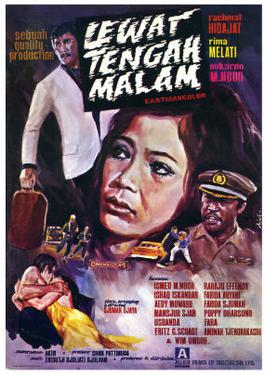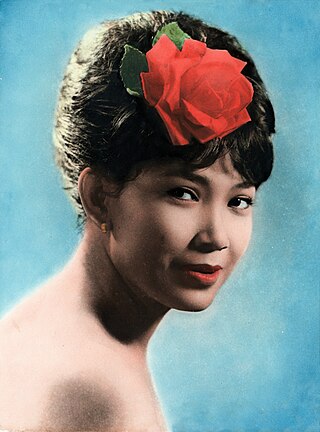The Citra Award for Best Picture is an award given at the Indonesian Film Festival (FFI) to the best feature film of the year. The Citra Awards, described by Screen International as "Indonesia's equivalent to the Oscars", are the country's most prestigious film awards and are intended to recognize achievements in films as well as to draw public interest to the film industry.

Lewat Tengah Malam is a 1971 Indonesian film and the first feature-length production by director Sjumandjaja. Starring Rachmat Hidayat, Rima Melati, and Soekarno M. Noer, it follows a thief named Lono who steals from the corrupt to give to the poor. The film, which may have been influenced by The Thomas Crown Affair (1968), was reportedly very tiring for the director, who briefly considered never directing again. The social realist elements led to Suharto's New Order government keeping Sjumandjaja under surveillance.
Salah Asuhan is a 1972 film directed by Asrul Sani, produced by Andy Azhar, and starring Dicky Zulkarnaen, Ruth Pelupessy, and Rima Melati. Adapted from Abdoel Moeis' 1928 novel of the same name, it tells of a man who betrays his upbringing for the metropolitan life, while at the same time marrying an Indo woman instead of the one chosen by his mother.

Pengantin Pantai Biru is a 1983 film directed by Achmad Salim, produced by Ferry Angriawan, and starring Meriam Bellina and Sandro Tobing. It follows two castaways, children who grow up with one of their fathers but must fend for themselves after they are captured and deified by natives. Adapted from Henry De Vere Stacpoole's novel The Blue Lagoon, via the film of the same name, Pengantin Pantai Biru introduces several differences to the story.
Herwin Novianto is an Indonesian film director who won the Citra Award for Best Director at the 2012 Indonesian Film Festival for his drama Tanah Surga... Katanya . He later directed Aisyah, biarkan kami bersaudara in 2016 which starred Laudya Cynthia Bella.

The Citra Award for Best Actress is an award given at the Indonesian Film Festival (FFI) to Indonesian actresses for their achievements in leading roles. The Citra Awards, described by Screen International as "Indonesia's equivalent to the Oscars", are the country's most prestigious film awards and are intended to recognize achievements in films as well as to draw public interest to the film industry.

Air Mata Iboe is a 1941 film from the Dutch East Indies directed and written by Njoo Cheong Seng. Starring Fifi Young, Rd Ismail, Ali Sarosa, and Ali Joego, it followed a mother who raises her children lovingly but is ultimately betrayed by her eldest sons when she falls upon hard times. The film, billed as a "musical extravaganza," featured a soundtrack by R. Koesbini, and an eponymous title song written by Njoo.

The Citra Award for Best Actor is an award given at the Indonesian Film Festival (FFI) to Indonesian actors for their achievements in leading roles. The Citra Awards, described by Screen International as "Indonesia's equivalent to the Oscars", are the country's most prestigious film awards and are intended to recognize achievements in films as well as to draw public interest to the film industry.
Poetri Rimba is a 1941 film from the Dutch East Indies which was directed by Inoe Perbatasari and produced by The Teng Chun for Jacatra Film. A love story, it tells of a man who rescues a woman from a gang of thieves and escapes through the jungle.
The Citra Award for Best Supporting Actress is an award given at the Indonesian Film Festival (FFI) to Indonesian actresses for their achievements in a supporting role. The Citra Awards, described by Screen International as "Indonesia's equivalent to the Oscars", are the country's most prestigious film awards and are intended to recognize achievements in films as well as to draw public interest to the film industry.

Boes Boestami was an Indonesian journalist and film actor. He was mostly known for his comedic roles.

Marlia Hardi was an Indonesian actress who was active from 1950s to 1980s. Born in the Magelang, she took to the stage in the 1940s before moving to Jakarta in 1949. Two years later she made her feature film debut in Untuk Sang Merah Putih. Over the next two decades she appeared in over seventy films, became recognized for her depictions of mothers, and received the Citra Award for Best Supporting Actress. Despite her productiveness, however, she sank into debt and committed suicide at the age of fifty-eight.

Frieda Thenu, better known by the stage name Farida Arriany, was an Indonesian actress, model, and singer. She was named the most successful Indonesian film star in 1960s.

Indriati Gerald Bernardina, also known by her stage name Indriati Iskak and after marriage as Indri Makki, is an Indonesian actress turned psychologist and marketer. She entered the Indonesian film industry and soared to popularity with Usmar Ismail's commercially successful Tiga Dara (1957). She appeared in eight further films and established her own girl group before retiring from cinema in 1963. She graduated from the University of Indonesia with a degree in psychology in 1968, and has taught the subject at the Jakarta Art Institute. For twenty-six years she worked with Unilever, and since 1994 she has been a marketing consultant with Makki Makki.

Marjolein Tambayong, better known by her stage name Rima Melati or by her nickname Lientje, was an Indonesian actress, model, and singer. She appeared in close to one hundred feature films, including works by Wim Umboh, Sjumandjaja, and Teguh Karya. She received multiple awards, including a PWI Award for Best Actress for Noda Tak Berampun, a Citra Award for Best Leading Actress for Intan Berduri, and five nominations for the Citra Award for Best Supporting Actress.

Abdul Hamid Arief was an Indonesian actor who appeared in more than 120 films. Born in Batavia, Dutch East Indies, he started his acting career in theatre before migrating to film with 1948's Anggrek Bulan. His first starring role, and the one from which he first gained recognition, was as the title character in Pangeran Hamid. Over subsequent decades he was a productive film actor, often appearing in four or five films a year. He also acted in various television series.

Baby Constance Irene Theresia Huwae was a Dutch-born Indonesian film actress and singer. Born in Rotterdam, she had moved to Indonesia by the 1950s and taken up modelling. She entered the film industry in 1958, and gained popularity following the success of Asrama Dara. Over the next several years she acted in a further five films and established a girl group, the Baby Dolls. However, after she married in 1960, Huwae focused on modelling. In the 1970s she worked as a fortune teller.

Farouk Achmad, often credited as Farouk Afero, was a Pakistani-born Indonesian film actor. After making his feature film debut in 1964, he rose to fame in 1970 with Bernafas dalam Lumpur. Afero ultimately appeared in more than sixty films.

Paula Frans Rumokoy was an Indonesian actress, model, and dancer who was active in the 1960s and 1970s. She along with Suzan Tolani earned the nickname of "most popular Indonesian star" in the 1970s.














